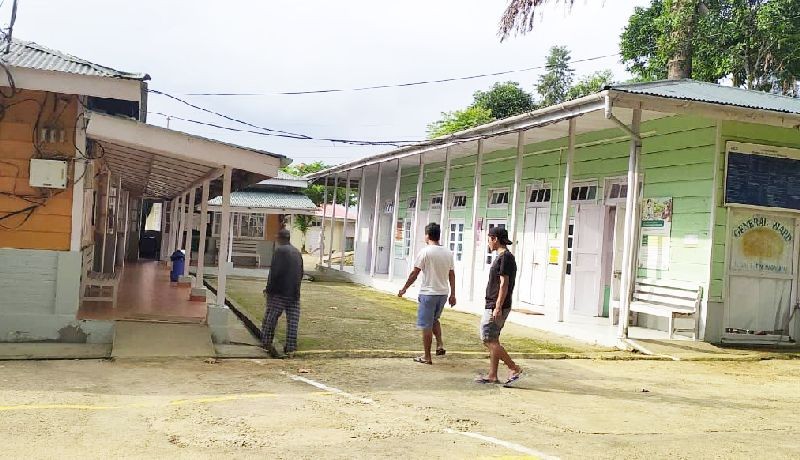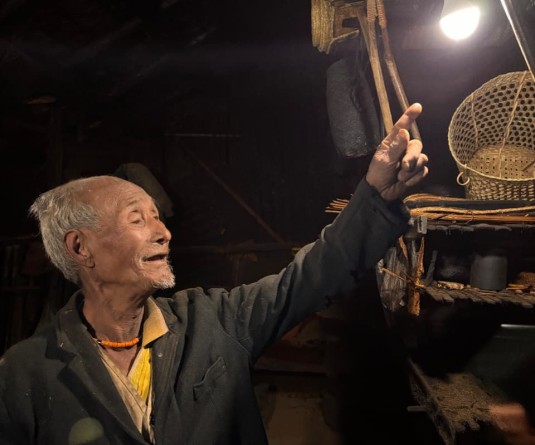After the Tuensang District Hospital was activated as a COVID-19 Hospital, the PHC at Longpang village has been functioning in the capacity of a ‘District Hospital’ to cater to the general health of its citizens. (Morung Photo)

Community healthcare initiatives to the government’s rescue
Morung Express News
Dimapur | June 8
As the COVID-19 pandemic continues to expose the gnawing rot in Nagaland’s public healthcare system, it has also brought to light how community supported healthcare initiatives are coming to the government’s rescue at this time of crisis.
With not even a single private clinic in Tuensang town, the headquarter to one of the oldest districts in the state, a Primary Health Center (PHC) at Longpang village, 26 kilometers away from Tuensang town is now functioning in the capacity of a ‘District Hospital’ to cater to the general health of its citizens. PHC Longpang also known as the ‘House of Hope’ is a community health undertaking through the stewardship of Eleutheros Christian Society (ECS), an NGO founded by Rev Dr Chingmak.
This transpired after Tuensang District Hospital was activated into a full-fledged COVID-19 Hospital after returnees from Chennai began to test positive with the virus.
Forthrightly put, a Primary Health Centre (PHC) being compelled to play the role of a District Hospital in any given situation would be the most abject indication of a dysfunctional and dismal state of affairs of the public healthcare sector.
Basically, a PHC is one of India’s three-tier rural health care systems, which also comprises of Sub-Centre and Community Health Centre. Across the state, PHCs, the first point of contact for people with health issues, are miserably afflicted by shortage of basic medicines, workforce and disrepair.
Fortunately, the community run PHC at Longpang, unlike other village health centre is equipped with the infrastructure of a mini-hospital. This include ultrasound, latest testing facility, an Operation Theatre, 24/7 doctor and a team of well trained nurses. While the PHC has a 20 bed capacity, it is in the process of creating space for another 10 beds. The Longpang PHC will also appoint doctor courtesy from HCL groups while the state government has also committed to provide more health caregivers.
While the distance from Tuensang town to Longpang PHC can be taunting or inconvenient for many patients with the lockdown severely affecting transport and communication, there is a 24/7 Ambulance and a taxi from the ECS office in Tuensang town which acts as an urban PHC to refer patients to Longpang.
Criticality of community engagement
“We are here to help, but then that just goes on to show the kind of infrastructure there is in one of the oldest district in Nagaland.
At the same time, because we have a communitised system, today in a situation like COVID-19, we are able to support the government,” Rev Chingmak said during an interaction with The Morung Express.
Following the same model, the ECS has also adopted Changlangshu PHC and Mopong PHC under Mon district. Now, along with doctors and trained nurses appointed by the community, these PHCs are equipped with ultrasound equipments and testing facility and even solar based cold chain system.
Mention may be made that Changlansghu PHC, since its transformation, is a recipient of the Kayakalp Award- an initiative of the Ministry of Health & Family Welfare, Government of India, to promote cleanliness and hygiene in public health facilities- for two consecutive years besides being awarded the best Community PHC in the state on January 26, 2020.
Giving his observation on the criticality of community engagement, Rev Chingmak underscored that community involvement and participation should be the way forward in fighting the pandemic.
“The government should take lessons on how investment in community effort has paid off. This has to be taken seriously,” Rev Chingmak stated while pointing to how community involvement has transformed basic PHCs into highly capably health servicing centre.
“Today it may be COVID-19, tomorrow it may be Ebola. This pandemic has exposed all of us and it has shown that we are not ready. It has shown that we have to redesign the system,” he added.
Wasted opportunity on testing, social platforms
Rev Chingmak was also critical of how the state government has been handling or mishandling to contain the spread of the COVID-19 pandemic in the state. For one, the state government wasted enough opportunity during March and April in devising a system to strengthen/equip every headquarter blocks to deal with the pandemic.
With no cure or vaccine for the virus in sight, Rev Chingmak said testing and quarantining remains the only way to stop the spread of the virus and more efforts should have been given to it early on and not after positive cases have been reported. Recalling his fight against the HIV/AIDS during the early 90s and the lessons he learnt as a classic example, Rev Chingmak said testing was the most crucial means for prevention.
Another wasted opportunity, according to Rev Chingmak, is the state government failed to take advantage of the vital social platform in Nagaland. “We have such a beautiful social platform unlike any other society. Today we are sustaining because of it. But did the government call and say- hey, we have this much of funding and so and so, can we all work together?”
Rev Chingmak maintained that Nagaland has been able to sustain this far because of efforts put in by the tribal societies, NGOs, churches, students and volunteers. “For instance, in Tuensang, 300 people from the various Baptist churches are cooking every day and night for those in quarantine and frontline workers. That’s the beauty of community engagement.”






